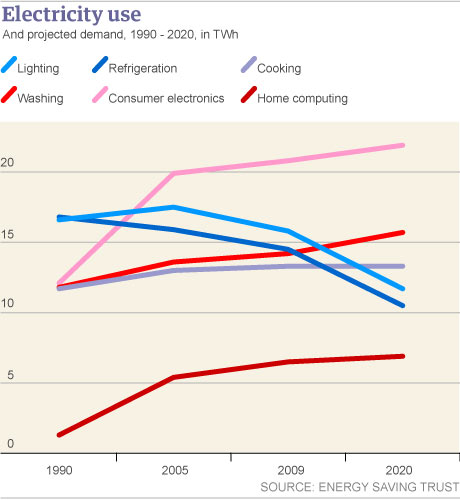Energy Saving Trust says consumers must be weaned off TVs, laptops, tablet PCs and fridges if emission targets are to be met
The Energy Saving Trust says our obsession with gadgets such as plasma TVs is pushing up bills and emissions. Photograph: Jochen Luebke/AFP/Getty Images
Energy-conscious home owners may religiously switch appliances off at the plug, insulate their houses and turn off lights in empty rooms, but our obsession with gadgets means energy bills and emissions are still rising, according to a report (pdf) on UK home energy use.If we do not cool our love affair with gadgets and appliances such as smartphones, tablet PCs and electric toothbrushes we are likely to fall short of 2020 targets to cut domestic electricity emissions by 34%, says the report from the Energy Saving Trust, an independent organisation that advises on saving energy and lowering carbon emissions.
"If we look over the last five years a lot has changed and a lot of progress has been made making the most energy-sapping appliances more efficient," said Dr Paula Owen, the author of the report The Elephant in the Living Room. "But where we still have a long way to go is with our gadgets and home entertainment appliances, which are using more and more electricity."
A desire for energy-guzzling products such as extra large fridges and flatscreen televisions is pushing up home electricity bills and making carbon targets increasingly unlikely to be achieved, she said.
"What amazes me is that you wouldn't buy a car without taking into consideration how fuel-efficient it was but people will buy electrical products without thinking about how much it is going to cost to run them," she added. "As energy prices continue to rise they are eating up more of our money. People need to be more educated about what these gadgets cost."
Among the main offenders are big plasma TVs, 600-litre fridge freezers, wireless routers that remain on all day, tumble dryers and 50W halogen spotlights. The number of domestic gadgets and appliances in the average UK household increased by three and a half times between 1990 and 2009, according to the report, and overall energy consumption from consumer electronic goods rose by more than 600% between 1970 and 2009.
"Human ingenuity knows no bounds and we will not stop finding you ways to entertain ourselves with new technology, and of course that is to be applauded," said Owen. "But we are obsessed with gadgets and in these austere times people need to think about what they buy, if they need it and how they use it."
The research comes five years after the Energy Saving Trust's report The Rise of the Machines which found that the number of electrical appliances, products and gadgets people typically own has trebled since the 1970s. Although these appliances have been getting more efficient, electricity consumption from domestic appliances doubled between 1970 and 2002.
The new report finds that despite householders' efforts to switch to energy-efficient products, we are actually consuming more energy than five years ago, with almost a third of all the UK's carbon emissions coming from the home.
Progress has been made, said Owen. Lighting and fridges – traditionally the most energy-consuming products in the home – are becoming more efficient, while the phasing out of incandescent light bulbs has brought down the overall contribution of lighting, and is expected to lead to further reductions by 2020.
The proliferation of new gadgets such as laptops, tablets and powerful desktops shows no sign of abating, however. Between 2000 and 2009 electricity use from home computing more than doubled, and the number of devices in Britain's homes rose from 30,000 to 65,000. Laptop ownership is expected to treble by 2020, and the report says this may help bring energy consumption down, as new models consume around 15% less energy than desktop machines.
But it warns that more should be done to help consumers make the right choices so emission targets can be met. "To achieve our targets for 2020 we are going to have to try harder ... if we continue like this we are not going to make it," said Owen.
Source www.guardian.co.uk/



No comments:
Post a Comment